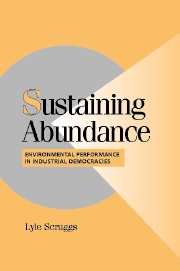Book contents
- Frontmatter
- Contents
- List of Figures and Tables
- Preface
- 1 INTRODUCTION
- 2 MEASURING NATIONAL ENVIRONMENTAL PERFORMANCE
- 3 ECONOMIC DEVELOPMENT, GEOGRAPHIC ADVANTAGE, AND ENVIRONMENTAL PERFORMANCE
- 4 PUBLIC OPINION, ENVIRONMENTAL MOBILIZATION, AND ENVIRONMENTAL PERFORMANCE
- 5 PLURALISM, CORPORATISM, AND ENVIRONMENTAL PERFORMANCE
- 6 POLITICAL INSTITUTIONS
- 7 CHECKING THE ROBUSTNESS OF THE RESULTS
- 8 CONCLUSION
- Appendix I Estimated Measures of Environmental Performance
- Appendix II Institutions for Environmental Policy Making in Fourteen Countries
- References
- Index
- Titles in the series
4 - PUBLIC OPINION, ENVIRONMENTAL MOBILIZATION, AND ENVIRONMENTAL PERFORMANCE
Published online by Cambridge University Press: 07 December 2009
- Frontmatter
- Contents
- List of Figures and Tables
- Preface
- 1 INTRODUCTION
- 2 MEASURING NATIONAL ENVIRONMENTAL PERFORMANCE
- 3 ECONOMIC DEVELOPMENT, GEOGRAPHIC ADVANTAGE, AND ENVIRONMENTAL PERFORMANCE
- 4 PUBLIC OPINION, ENVIRONMENTAL MOBILIZATION, AND ENVIRONMENTAL PERFORMANCE
- 5 PLURALISM, CORPORATISM, AND ENVIRONMENTAL PERFORMANCE
- 6 POLITICAL INSTITUTIONS
- 7 CHECKING THE ROBUSTNESS OF THE RESULTS
- 8 CONCLUSION
- Appendix I Estimated Measures of Environmental Performance
- Appendix II Institutions for Environmental Policy Making in Fourteen Countries
- References
- Index
- Titles in the series
Summary
A common explanation for environmental protection in advanced democracies is public awareness and concern about environmental problems. Virtually all studies cite, in one form or another, theemergence of environmental preferences among citizens as an important cause of action. According to such arguments, citizens perceive the environmental impact of industrial production as undesirable. Advances in the scientific understanding of the effects of human activity on the natural environment and recognition of the dependence of human society on environmental processes have also helped focus attention on environmental policy reforms. Greater scientific understanding has been ever more widely communicated via the news media, and increases in physical well-being since World War II have increased the salience of environmental protection on the political and social agenda.
Despite the research on increasing environmental concern and its causes, the relationship between mass attitudes and environmental outcomes in comparative politics remains virtually unexplored. This chapter attempts to address this oversight by investigating the relationship between the “mobilization of environmental bias” and environmental performance in advanced democracies. Drawing on several international opinion surveys and electoral data on environmental parties, I assess whether cross-national differences in aggregate support for environmental protection help us to explain cross-national differences in environmental performance in ways commonly assumed. Additionally, I investigate the extent to which cross-national differences in environmental mobilization are related to income. Then, the chapter more systematically evaluates the idea introduced in the preceding chapter that “environmental mobilization” is largely a product of income growth.
- Type
- Chapter
- Information
- Sustaining AbundanceEnvironmental Performance in Industrial Democracies, pp. 78 - 121Publisher: Cambridge University PressPrint publication year: 2003



